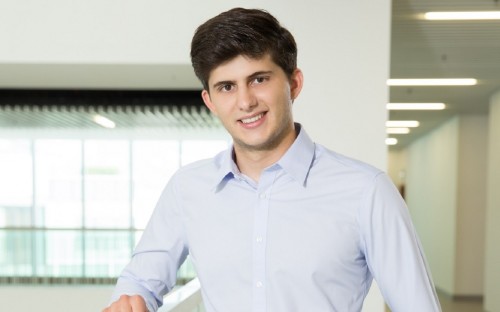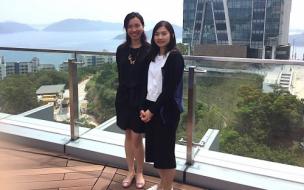In Ireland, he was one of a few selected among thousands to attend a digital marketing masterclass at Google’s AdCamp. He turned down a permanent sales job at Google and instead accepted a marketing technologist role at Runtastic, a creator of fitness-focused apps.
After the Austrian app-maker was acquired by Adidas in a $240 million deal late last summer, the adventurous Latin American relocated to Asia for his MBA.
The high-flying tech wizard, a current MBA student at Hong Kong’s CUHK Business School, expects advances in technology and the use of big data analytics to completely transform the way businesses market their products.
He is well placed to know. Since leaving his native El Salvador more than seven years ago, Gerardo has traversed across the globe in pursuit of his passion for marketing technology.
Alongside his undergraduate business studies in Germany, he worked on IBM’s digital marketing strategy, building the IT giant’s strategic relationship with Apple.
Five months before graduation and Gerardo has already landed a dream job. He was hand-picked by one of CUHK’s elite alumni mentors to be CEO of a marketing technology start-up in Hong Kong.
What do you see as the future for marketing?
The way we are doing marketing at the moment is going to change completely. Right now we’re focusing on how to sell more. In the future we’re going to focus more on how to create a greater user experience or “user journey”; how the user feels from the moment they first interact with the company to the moment they convert and start paying for the service.
We’re going to see less investment in terms of advertising and higher investment in terms of the technology that enables these types of interactions.
Most of the investments will be made inside marketing departments, and people in marketing will have more tech-related backgrounds and responsibilities. The chief marketing technologist is a new position which is closing the gap between IT and the marketing department.
What role will big data play?
Decisions are going to stop being driven by emotion and become data-driven. Companies that create comprehensive knowledge out of big data are the companies that are going to stay around the longest and achieve the highest revenue.
Why are increasing numbers of MBAs looking to work in start-ups?
It’s a cultural shift.
For my generation, the goal is no longer to make money. We focus on what we can leave behind and what impact we can have in the world.
I rejected Google to go work at a start-up because I knew that the opportunities were going to be better and that I would be able to make a greater impact.
What did you learn about Google as a company from your AdCamp experience?
Google has an image as a hugely innovative company but in reality it depends on your position. If you work in sales, they’re still going to ask you to deliver on your results and focus on your KPIs. Just like in any other corporation, the more you sell, the better.
What I did find fascinating was how they allowed you to allocate time on projects depending on what you thought was important rather than what your job was related to. They give you a lot of flexibility but they also expect a lot from you.
Why did you decide to pursue an MBA?
I definitely wanted to do a master’s degree and an MBA was one of the best options.
It’s not very common for someone of my experience to do an MBA. Most people I’m working with here have five to 10 years of experience, while I have around two and a half. But I knew therefore, that my learning experience would be greater.
Why did you decide to study at CUHK in particular?
I had an interview with professor Ferguson — the dean of CUHK’s program — and he showed me how it [the program] was more focused on entrepreneurship than any other in Asia.
I thought it sounded fantastic. I wanted to see something new and I was intrigued by the Asian culture.
How have you profited from your MBA experience so far?
Without the MBA, I wouldn’t have been able to land the job I wanted. Something that I truly was not expecting at this point in my career, was enabled only by CUHK.
RECAPTHA :
f0
57
6c
36








